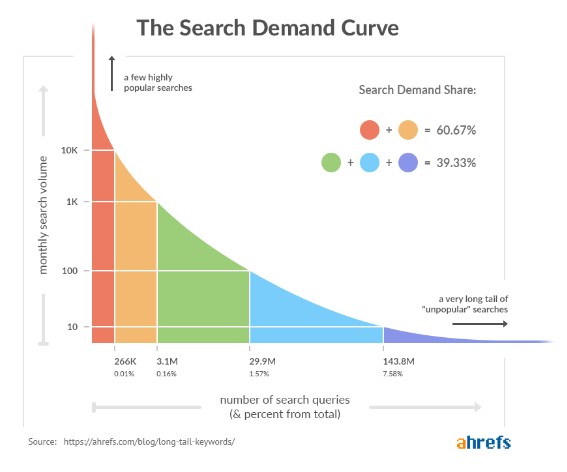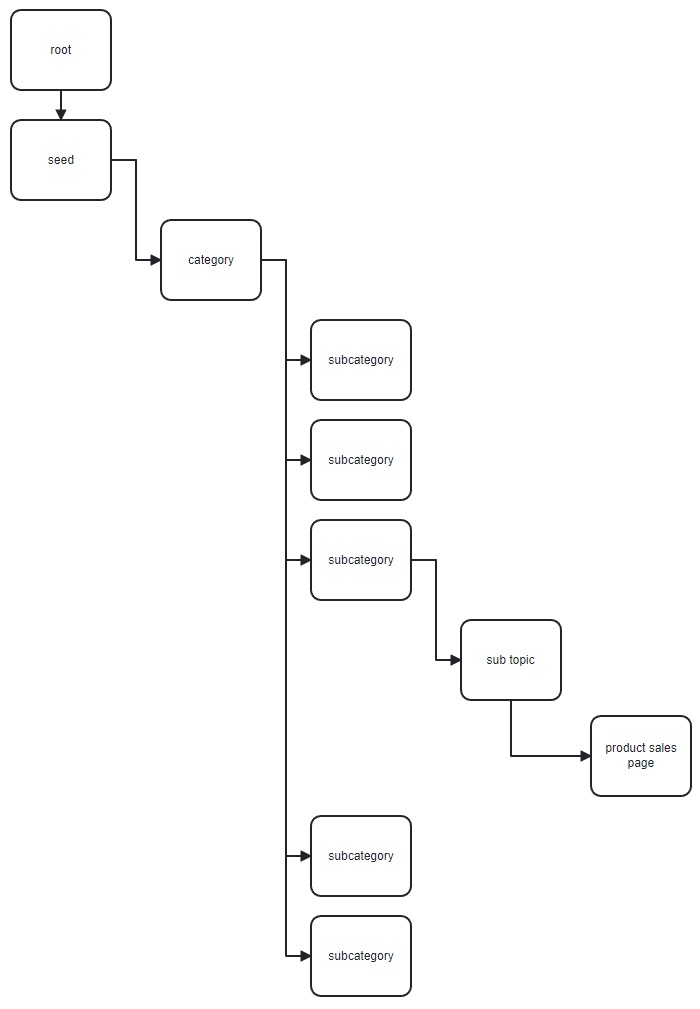Why do we need long tail keywords?
Most long-tail keywords have three to five individual words.
To reach a specific subset of the keyword population, use these longer keywords rather than shorter terms, that are by definition aimed at a much broader market.
Think, blue suede shoes, vs shoe.
Sure the search volume for 'shoe' is much higher, but people seeking blue suede ones will need to wade through a lot of other shoes to find what they are looking for. Because these longer queries are tailored to more accurately reflect how people actually search.
These keywords are also much less competitive than generic keywords (according to keyword research tools, that likely purchase keyword data from Google Click-stream data merchants) - specifically because their individual search volumes are much lower (however their Pay Per Click ad values may be substantially higher because of their capacity to convert).
More targeted, high-quality visitors who are more likely to become paying customers can be attracted to your site through the use of long-tail keywords - short-tail keywords, also known as head terms lack specific search intent because they are so non-specific in nature.
Users will often conduct a broad keyword search to start, using a high volume, but lower specificity description of the problem they hope to solve.
They then narrow it down as they get closer to the solution to their problem. More popular keywords = less specific solutions, and inversely, less popular keywords are usually more relevant keywords, but are aimed at a smaller audience.
To set your company apart from the rest, you will not only want, but need to use long-tail keywords.
To what extent do search engine optimization strategies require the use of long-tail keywords?
Long tail keywords are used in over 70% of all search queries - all the time. [2]
The definition of long tail can be a little confusing, 92% of searches submitted to google are long tail keywords. [1] and as illustrated below, these terms have lower monthly search volumes as an individual query.
Voice search has made this a more common occurrence and that is likely because as humans, we want to specific, we can't communicate in broad strokes, we say what we want so that the conversation isn't a game of Whack-a-mole - think about how you interact with a device when you are asking it, we speak in long tail queries.

Nowadays, people generally phrase their Google searches the same way they would with a friend.
We use the term "natural language" to describe this type of communication and Google has used a vast array of technologies like Tensor Flow to process content and queries via a NLP (Natural Language Processor) type platform. What is interesting is that potential customers need to be addressed in the same way that they submit their long-tail keyword phrases.
Site structure to increase search traffic via long-tail terms
An effective SEO strategy that can help accomplish this is to build your site with seek keywords as part of the url structure, and build content silo's out from this seed structure.

In this way, the use of long-tail keyword strategies can improve the content's ability to attract users to the website and kick off the buyer's journey for your niche product - or address the buyer at their position within the buyers journey.
By tuning content relevance for long tails, sure we are losing traffic, this SEO strategy is one where we are losing traffic that wasn't going to convert - or more specifically we aren't aiming to get traffic that wants a much broader topic that a short-tail keyword would present in their expected result. When implemented as part of your content marketing strategy - you now have a 'tribe' that can effectively be re-marketed towards.
In turn, this helps brands attract new customers by exposing them to content that is more relevant to them. If you sell 'bees wax and Propolus protected axe sheaths' then your search volume is extremely small, but, they want what they want and you are addressing that users expectation.
When customers receive information that is pertinent to their goals, they are more effectively satisfied by the information provided.
Long tail keywords - are usually also less competitive keywords. They are a key player in the 'information gain' game.
Due to their narrow focus, long-tail keywords have lower levels of competition than their more general counterparts. Keywords can be more precisely tailored by brands to the services they offer.
Previously, you could use a seed keyword and with the help of SEO Tools, could find the long tail keywords with the highest search volume and use them on your website. The idea is that companies will find the highest volume keywords and then use those words to develop long-tail keywords that are similar to Google's suggested search terms. Google no longer provides access to actual search data, so even Google Keyword Planner data is only an estimate (primarily purchased via Google Click Stream). Historically, this type of tool's keyword suggestions carried more weight - these days we need to make use of brute force correlation and keyword tracking dictionaries combined with PPC (Pay Per Click) advertising volumes.
Since the Hummingbird update in 2013, Google appears to have been gradually incorporating a "semantic search" feature into its algorithms that cater to organic search, changing the apparent weighting applied to the previous method of searching that was so heavily reliant on individual keywords.
You can't possibly optimize every piece of content on your site for the same set of keywords - doing so muddies the water for a search engine like Google 'which one of these is the one to show to the searcher?".
The user is in the final stages of the buyer's journey when they use long tail keywords like "blue suede shoes in Melbourne" or "buy blue leather footwear near me."
For better search engine rankings, avoid using generic terms like "shoe shop" and instead use more specific terms like "mens suede leather footwear" and "blue suede shoes"
Long-tail keyword analysis for low-competition keywords Create buyer personas and connect them to the various stages of the customer's buying process.

Notice the CPC value is highest with the most specific query.
Conclusion:
Long tail keywords may not result in the highest search volume per month, and the cost to advertise in the PPC or CPC market is prohibitively high. However these queries address the buyers search intent and in doing so will present your product, or products to businesses and individuals on the cusp of making the conversion decision. You are free to create content that is topic rich and highly relevant to the searcher.
Ride the creative wave, and aim to please the buyer at the bottom of the funnel.
Sources:
[1] https://backlinko.com/hub/seo/long-tail-keywords
[2] https://www.brightedge.com/glossary/long-tail-keyword

